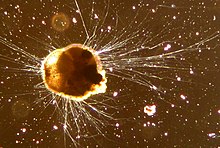Foraminifer
| Foraminifera Temporal range: 542–0 Ma Cambrian–Recent |
|
|---|---|
 |
|
| Live Ammonia tepida (Rotaliida) | |
| Scientific classification | |
| Domain: | Eukaryota |
| (unranked): | SAR |
| (unranked): | Rhizaria |
| Phylum: | Retaria |
| Subphylum: |
Foraminifera d'Orbigny, 1826 |
| Orders | |
|
Allogromiida |
|
Allogromiida
Carterinida
Fusulinida — extinct
Globigerinida
Involutinida — extinct
Lagenida
Miliolida
Robertinida
Rotaliida
Silicoloculinida
Spirillinida
Textulariida
incertae sedis
Xenophyophorea
Reticulomyxa
Foraminifera (/fəˌræməˈnɪfərə/, Latin meaning hole bearers; informally called "forams") are members of a phylum or class of amoeboid protists characterized by: streaming granular ectoplasm for catching food and other uses; and commonly an external shell (called a "test") of diverse forms and materials. Tests of Chitin (found in some simple genera, and Textularia in particular) is believed to be most primitive type. Most foraminifera are marine, the majority of which live on or within the seafloor sediment (i.e., are benthic), while a smaller variety float in the water column at various depths (i.e., are planktonic). Fewer are known from freshwater or brackish conditions, and some very few (nonaquatic) soil species have been identified through molecular analysis of small subunit ribosomal DNA.
...
Wikipedia
